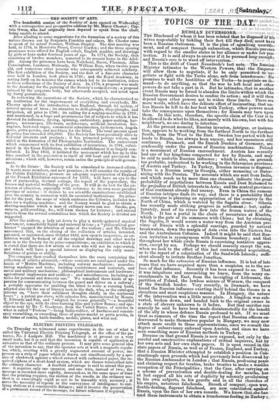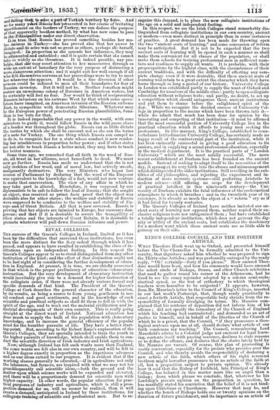TOPICS OF THE ?Tar •anilig'!) RE XIIIMI lo. tit .
si DID no ItEnnulthauti RUSSIAN DIVERSIONEkoed 7.Iitenaeqe /tuft to Tire Bluebeard of whom it has been related that heillispietaiiifilthci wives respectably by tickling their .feet till the$ died/ must kali been a Russian statesman. It is the -plan of. agaikitig sitiltattile.L; ment, and of conquest through exhaustion, which,ltusgaipursilee with regard to the smaller states in her alliance.ormuhir luirpriaL tection. It is said always to answer if it be pursue4 ltnigiartittughl. and Russia's care is to ward off intervention. 719biw oe This is the drift of Count Nesselrode's last note. Ito Ilatitisiad Minister intimates to the Western Powers, that , the asperei,, will allow them to negotiate, if he be only pernrittetigtolto gotiate or fight with the Turks alone, safe from interfereneteJlife.,,o promises to wait the hostilities of the Turks—to megittintelsniele-, mand—to do anything, so that the war be loft local end. other powers do not take a part in it. But he intimates, that in another. event Russia may be forced to abandon the limits within which the Russian Government desires to confine its action ; and it will then depend upon other powers not to widen these limits. There are more words, which have the delicate effect of insinuating, that .un- less Russia be left to do her best with Turkey, other powers must take the consequence upon themselves ; for Russia may turn upon them. In this note, therefore, the specific claim of the Czar is to be allowed to do what he likes, not merely with his own, but with his neighbour's, no one daring to interfere.
At the present moment, Russian invasion, intrigue, or insinua- tion appears to be working from the furthest North to the furthest South, from the West to the East. Sweden has parted with her lands to Russia, has always been uneasy, and her uneasiness still continues. Denmark, and the Danish Duchies of Germany are confessedly under the process of Russian machinations. Poland is a monument of Russian encroachment. Austria has recently had one of her kingdoms conquered for her by Russia, and may be said to underlie Russian influence ; which is also, on grounds too probable, understood to be working in the Solavonian provinces of Austria and Turkey. In Turkey, Russian invasion is-flagrant. There is a Russian army in Georgia, either menacingf or frater- nizing with the Persian. The accounts which are sent from India, and which reach us by more than one channel, indicate the great probability of negotiations between Russia and Bost Mahotned to the prejudice of British interests in Asia; and the central-provinces of that continent already feel uneasy. Even in Chins,the rumour of Russian intrigue finds its way, and there is a probability that some intrigue is planning an appropriation of the' eonntry m-the North of China, which is watered by the Ssgalin river.: Siberia
has recently made striking progress in settlement ;I unfor- tunately, most of its rivers flow into the frozen waters of the North. It has a portal in the chain of mountains at Kiachta, which is the gate of its commerce with China ; but by obtaining the Sagalin, it would secure a water-way from the Austrian pro-
vince of Russia with a splendid coastage, into by natural breakwaters, down the margin of Asia even Into the Eastern Sea and the Australasian Colonies. Indeed it might be said-that-Rus- sian irritation is synonymous with Russian boundary; and that throughout her whole circle Russia is exercising tentative aggres- sion, except by sea. Perhaps we should scarcely except the sea, when we look to the effect of this last contemplated acquisition, or to the report of a colonization of the Sandwich Islands ; suffi- cient already to irritate Brother Jonathan. So much for the extension of Russian influence. It is but of late
years that we have acquired more than a suspicion aa to the na- ture of that influence. Recently it has been exposed to us. That it was iniquitous and encroaching we knew, from the many en- croachments in the East, from the inveigling of Lithuania, the partition of Poland, the lawless seizure of Warsaw, the conquest of the Swedish border. Very recently, in Denmark, we have found the Russian influence exerting itself behind the throne in a circuitous and most suspicious manner. In Hungary, the nature of the intervention was a little more plain. A kingdom was sub- verted, broken down and handed back to the original owner in a state of slavery unknown to it before. But that sacrifice can scarcely be said to have been made disinterestedly for the benefit of the ally in whose defence Russia professed to act. If we must treat as rumours of the time the report that Russian officers en- deavoured to make themselves popular in Hungary, we may now attach more credit to those representations, since we remark the, degree of subserviency enforced upon Austria, and since we have
seen something more of Russian methods in Turkey. ' '1199.u.P Because on that ground Russia is now exposed, not only by .theli
careful and constructive explanations of critical inquirers, but by I w;, her own acts and her own state papers. It is upon recordialho' I state papers of Russia, as well as of France, England, and Turkey, that a Russian Minister attempted to establish a position in .Con. stantinople upon grounds which had previously been disavowed by the Russian Ambassador in London ; that Russia, professing peace and claiming respect for treaties, broke treaties to make a warlike occupation of the Principalities ; that the Czar, after carrying on a scheme of prevarication and double-dealing for months, has at last capped all his acts of duplicity by solemnly proclaiming to his own subjects, in his gazette and in all the clurrohes of his empire, notorious falsehoods. Breach. of compact, open Tar, double-dealing, flagrant falsehood, are now establishasLaiganist . Russia, upon the face of her own records. We know. tliatsheiluis,;, used these instruments to obtain a treacherous footing_inIurkeytt-, and failing thtlant. a p 1'1140 tereitOrk "by . And
seveted in her ethnic of irritating as for May y
unsettlement on the borders Tnikey, we can deduce the purpose of that apparently bootless method, by what has now come to pass ganllOtnntninlitiett under our direct observation. truar.thati. Russia. has proved something besides her ma- lusanniAnts Ant Tuzhey—she has proved also that her power to dieteAteinPto-amee'was not so great as others, perhaps she herself, 11,proportion as she spreads her influences, they may be nVAnatejitatid enfeebled ; and it is quite certain that she cannot take so widely as she threatens. It is indeed possible, nay pro- balileptbat 8,144:fma.y- court attention to her manceuvres through so widk, mireatent of -boundary for the very purpose of distracting a moreadagerous attention; and it might suit her well enough if all whelfeltothernselves nervous at her proceedings were to try to meet herVehesever shmappears. It would be a fine diversion if other poveits,enuld be indiiced to man all their boundaries for fear of Kusidan rinvasion: But it will not be. Brother Jonathan might scatter en unwelcome colony of Russians in American waters, but he certainly will feel no fear. Nor would he think of reciprocating Russian invasions on his extreme West by that which some specu- lators have imagined, an American invasion of the Russian extreme East, to sympathize with democratic Siberians. Whatever may be the European power of penetrating Russian plausibilities, Jona- than is too 'cute for that.
It is indeed improbable that any power in the world, with sane ministers to guide it, would follow Russia in the wild-goose chase of aboorder war throughout the globe. Russia can as little dictate the tactics by which she shall be encount2red as she can the terms of a, note.for Turkey. The one thing which Russia can compel us to do is, to recognize her for a state whose conduct is now render- ing her mischievous in proportion to her power ; and if other states are not able to teach Russia a better mind, they may have to teach her better manners.
Some time ago, we remarked that all faith in the word of Rus- sia, all trust in her alliance, must henceforth be dead. We must now go further. Russia has made us understand that she is not only reckless of her word, and of moral law, but actively unsafe, malignantly destructive. The very Ministers who began last session of Parliament by declaring that the word of the Emperor was equivalent to the knowledge of a fact, would not now venture to make that asseveration. The view of any affair in which he may take part is altered. Heretofore, it was supposed by our diplomatists to be safe to follow the lead of Russia ; that she sought an object, was received as prima facie proof that the object was desirable also for other states ; the welfare and stability of Russia were eupposedto•be conducive to the welfare and stability of Eu- rope and of Great Britain. All that is now reversed. Russia is proving that her objects arc inimical to Europe, her successes dan- gerous;; and that if it is desirable to secure the tranquillity of other states and the interests of Great Britain, it is desirable to promote whatever will pull down Russian influence and power.



































 Previous page
Previous page